How To Fix Ever Wing Lot Loading In Chrome
If you've done any research at all into different browsers, you lot're familiar with the fact that Chrome can be a scrap of a resource hog. Glance at your Task Manager or Action Monitor, and yous'll ofttimes run across Chrome at the top of the listing.
But why does Chrome use then much RAM, especially compared to other browsers? And what can you do to continue it in check? Here's how to make Chrome use less RAM.
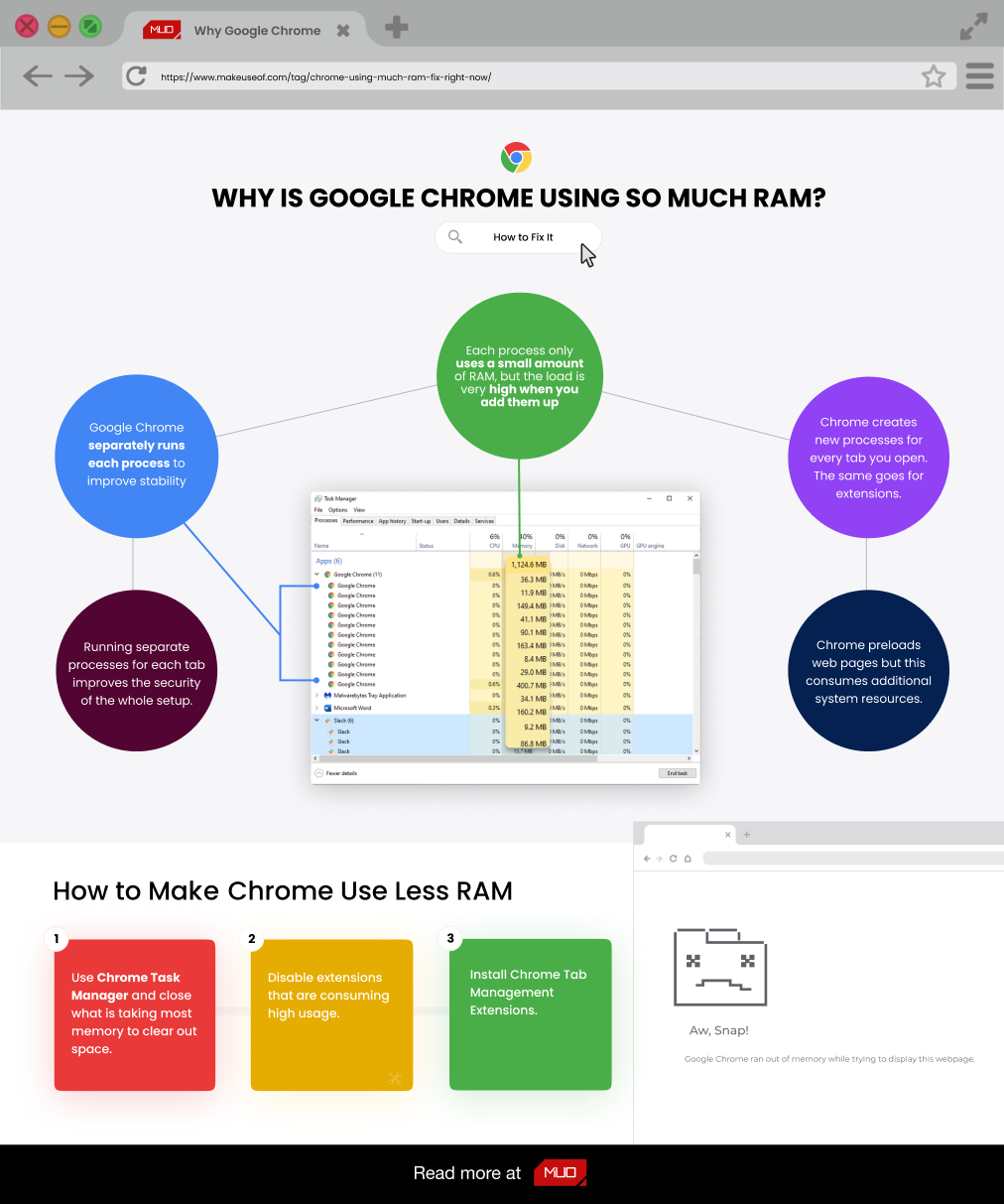
Does Google Chrome Actually Use More RAM?
Several years agone, the simply answer was Yes. Google Chrome'southward RAM-hungry reputation was well known.
However, changes to Google Chrome have improved browsers' retention usage, peculiarly compared to other popular browsers. At times, Mozilla, Border, Opera, and Safari all utilise more than RAM than Chrome. How do I know this? I ran a short test, opening a Facebook page, a YouTube video, the BBC Sport website, and Twitter in a clean browser.
The results will involvement y'all.
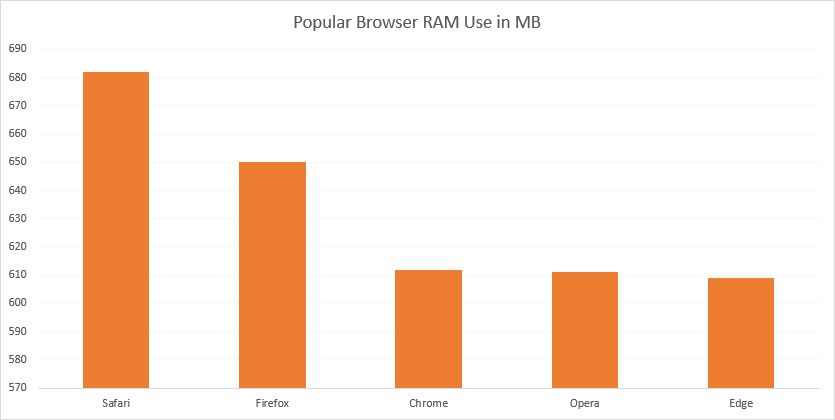
At that place is Google Chrome, sitting happily in the middle of the other browsers. Sure, this is anecdotal, and there is more than plenty evidence that Chrome eats more RAM than other browsers. If you have ever run your ain browser RAM-use test, there'due south a strong chance you found Chrome using more RAM than other browsers.
Google Chrome is admittedly one of the fastest browsers, but it needs a lot of RAM to take that title.
Why Does Google Chrome Utilise So Much RAM?
"Aw, Snap! Google Chrome ran out of memory while trying to brandish this webpage."
That's the message you run into when Chrome runs out of memory. To understand why Chrome uses so much memory, you need to understand how most modern browsers operate.
Every app on your calculator runs processes in your figurer'southward RAM, where the hard piece of work of running your computer takes identify. RAM is temporary storage for all kinds of information, and it is very fast. Your CPU tin can access data held in your organisation RAM much faster than a hard drive or fifty-fifty an SSD.
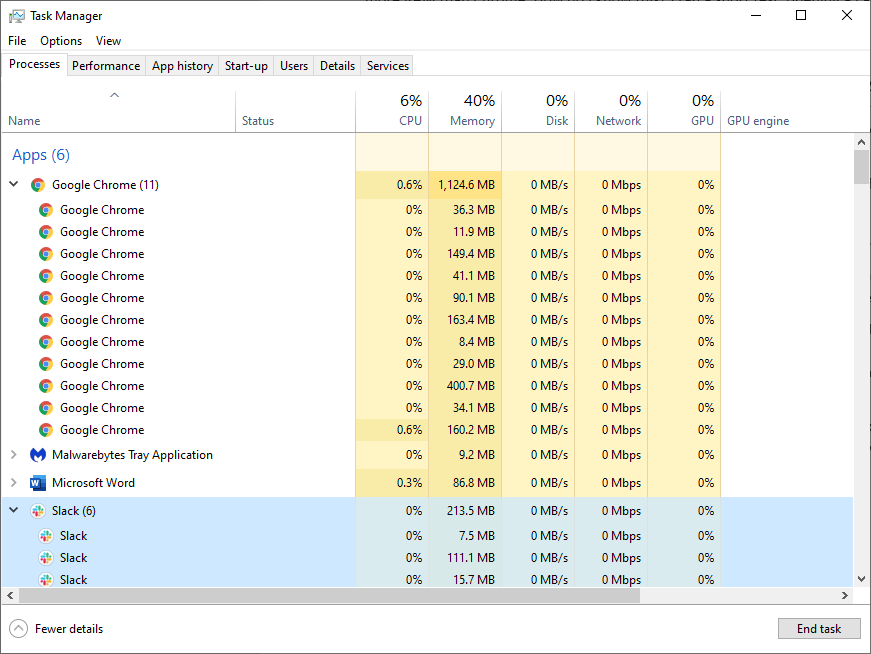
Chrome, Firefox, Opera, and Microsoft Edge store every tab, plugin, and extension in a different RAM process. This procedure is called isolation and prevents ane process from writing to some other one.
Hence, when y'all open your Task Director or Activeness Monitor, Google Chrome displays multiple entries. If yous look closely, you tin see that each process only uses a minor corporeality of RAM, but the load is very high when you add them up.
How Does Google Chrome Manage RAM?
Browsers like Chrome manage RAM this way to offering improve stability and faster speeds. Just Chrome even so uses a lot of RAM. At least, in many cases, it appears to be using more RAM than other browsers. Here's a short explanation as to how Chrome handles RAM.
The main reason for running each process separately is stability. By running each process separately, if i crashes, the entire browser remains stable. Sometimes, a plugin or extension will fail, requiring yous to refresh the tab. If every tab and extension was run in the aforementioned process, you might have to restart the whole browser instead of a single tab.
The downside is that some processes that single-process browsers can share between tabs must be replicated for each tab in Chrome. Splitting into multiple processes comes with security benefits, too, similar to sandboxing or using a virtual motorcar.
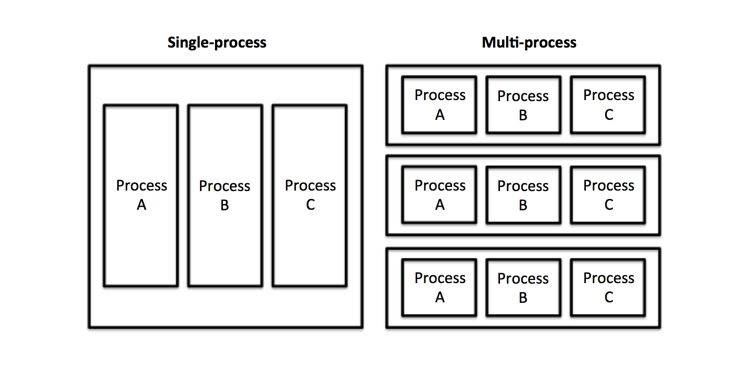
For example, if a JavaScript assail occurs in one tab, there is no fashion to cross into another tab within Chrome, which may well happen in a unmarried-process browser.
Adding to the amount of RAM usage in Chrome are plugins and extensions. Each plugin or extension you add together to Google Chrome requires resources to run. The more than extensions y'all have installed, the more RAM Chrome needs to run.
Pre-rendering is a notable example. Pre-rendering lets Chrome start loading up a webpage that it predicts y'all'll become to next (it might be the peak search result from Google or the "next page" link on a news site). The pre-rendering procedure requires resource and then uses more RAM. Just it also speeds up your browsing feel, peculiarly for ofttimes visited sites.
The flip side is that if at that place is a bug with the pre-rendering process, it tin can use more RAM than you might expect, slowing down other areas of your figurer or making the browser tab unresponsive.
Chrome RAM Use on Limited Hardware Devices
Chrome has some answers for RAM employ on low-ability devices or devices with limited hardware. However, the general rule is that when Chrome runs on capable hardware, information technology will operate using the processes model explained previously.
Whereas, when Chrome runs on a device with fewer resources, Chrome will consolidate into single processes to reduce the overall memory footprint. Using a single process allows for a reduction in resources only comes at the adventure of browser instability.
Also, Chrome is aware of how much retentivity it is using. Information technology isn't mindlessly eating every bit of RAM information technology tin discover. Chrome limits the number of processes it tin start depending on your system hardware. It is an internal limit, just when reached, Chrome switches to running tabs from the same site in a single procedure.
Updates Attempt to Stop Chrome Taking Up Memory
In belatedly 2020, Google Chrome developers appear they would introduce a RAM-saving feature known equally "PartitionAlloc Fast Malloc." Without delving too far into the feature'south technicalities, PartitionAlloc should stop any single process consuming more than 10 percent of the total system memory.
The improvement comes afterward Microsoft managed to reduce RAM utilise in the Chromium-based Edge browser using "Segment Heap," another improvement defended to reducing browser retention usage.
In March 2021, with the release of Chrome 89, PartionAlloc went live. Google claims that the feature reduces memory usage in 64-chip Windows by more than than 20 percent, with a further 8 percentage reduction in memory use through rendering. The change is notable. If you're using whatever version Chrome from version 89 onwards (Chrome 101 is the latest version at the time of writing), your browser volition discard old memory faster, reducing the RAM overhead and Chrome's reputation every bit a memory hog with information technology.
Is Google Chrome's RAM Usage a Trouble?
How much RAM does Chrome need? Is there a limit to the amount of RAM Chrome will employ before information technology becomes a problem? The answer lies with your system hardware.
Merely because Chrome uses a lot of RAM doesn't mean that it is necessarily causing a problem. If your system isn't using the available RAM, information technology isn't doing you lot whatsoever expert; your computer only uses RAM to access data rapidly and speed up processing. If you lot're keeping your RAM as articulate as possible, you're not taking reward of the power of your computer.
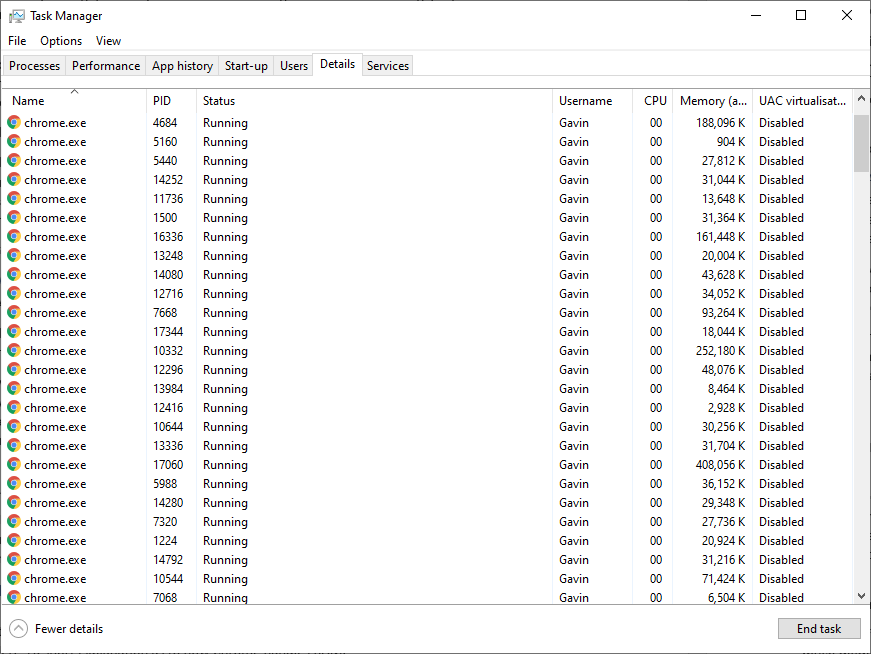
Merely like on a smartphone, clearing out your running processes and the RAM might ho-hum things downward in the long run. That's why RAM cleaners and boosters are bad for your smartphone.
Chrome Using Likewise Much Retention
However, if Chrome is using too much memory, it could turn into a problem. When Chrome uses too much memory, it limits the amount available for other programs. Chrome could fifty-fifty brainstorm to struggle to go along the of import data from your browser bachelor for quick access, negating the utilize of the RAM to begin with.
When it comes down to it, Chrome's RAM usage is only a problem if it slows your computer downward, be that your browser or your entire arrangement. If you run into Chrome using a lot of memory, only at that place are no negative performance consequences, it is not worth worrying most.
For instance, I sometimes have 50 or more Chrome tabs open up, using ii.5GB RAM or more than. It sounds similar a huge amount, but my organization has 32GB RAM to use, then it isn't an outcome. (How much RAM do yous really need, anyhow?) Try the same on a laptop with 4GB RAM, and you're going to have a bad time.
If Chrome's memory utilise is slowing things down, it is time to accept activity.
How to Make Chrome Use Less RAM
At that place are several ways you lot can speed upward your browsing feel and reduce the amount of RAM Chrome uses. The near important tool at your disposal is the Chrome Task Manager.
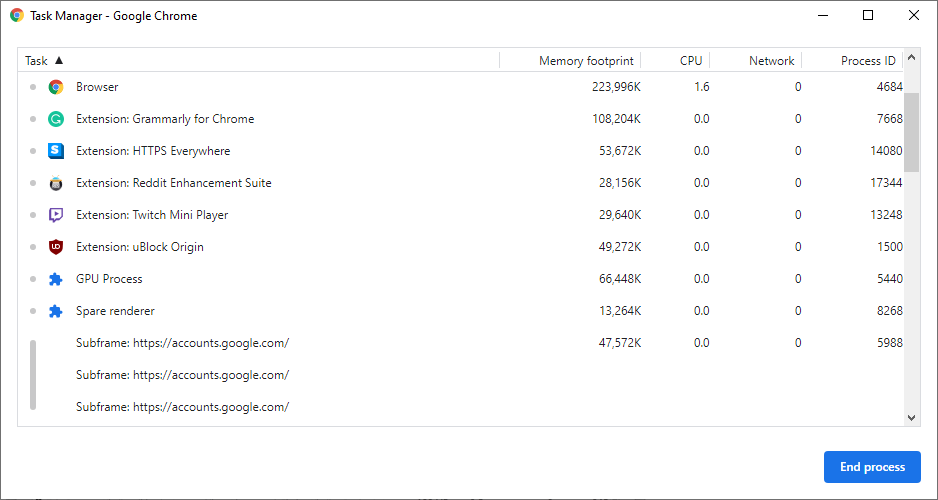
Similar to the Windows Task Managing director, the Chrome Chore Manager shows the performance and consumption of each tab and extension inside the browser. You lot tin use the Chrome Task Manager to figure out what is using the nigh memory, so close them to free up infinite.
In Windows, hit Shift + Esc to access the Task Manager. On a Mac, you lot'll demand to open it from the Window menu. Select the procedure, and then hit End process.
Look out for tabs and extensions that have ballooned in size. Sometimes, a single Chrome tab tin use lots of retentiveness due to a bug or poor configuration. Sometimes, a Chrome retention leak volition cause your browser to freeze (or fifty-fifty your whole arrangement).
Once you've killed off the resource-heavy processes, in that location are some other things you tin do to set frequent Chrome crashes.
Manage Plugins and Extensions to Save Chrome Retentivity
You tin disable extensions that are using a lot of ability. Alternatively, yous tin set them to activate merely when using a specific site.
Right-click the extension and select Manage extensions. Change the "Permit this extension to read and change all your data on websites that you visit" to either On click or On specific sites.
If you have a lot of extensions that you utilise for dissimilar things, consider installing a quick extension manager. SimpleExtManager adds a pocket-sized dropdown box aslope your extension tray. Then it is one click on and off for all extensions.
Install Chrome Tab Management Extensions to Reduce Retentivity Apply
Installing more extensions to manage Chrome's RAM use problems sounds counterintuitive, especially subsequently all of the issues you lot just read about.
Some extensions are designed specifically with RAM management in heed, helping y'all customize how Chrome handles and discards tabs you are no longer using.
For instance, The Great Discarder allows yous to customize the frequency Chrome discards unused tabs. Chrome discards tabs when they're non in use to salvage retentivity. With The Cracking Discarder, yous can modify the length of time, specify tabs not to discard, and so on.
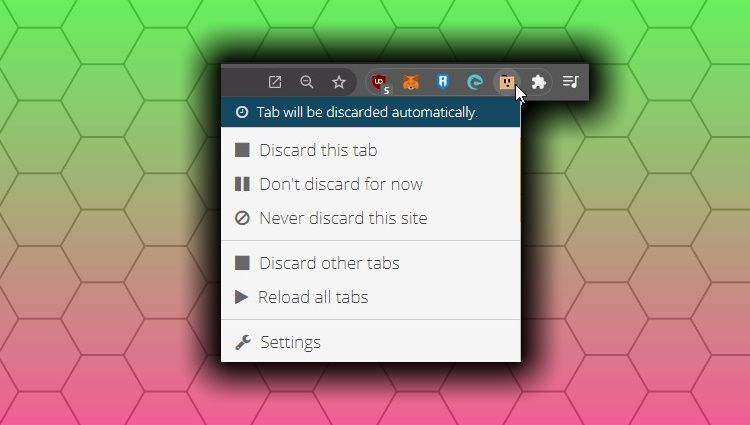
Is Google Chrome Using Too Much Retention?
Chrome is the dominant browser globally. Culling browsers like Firefox and Opera can apply a similar amount of memory as Chrome, then switching isn't always the best option. If Chrome is using besides much memory on your organization, but you want to keep within the Chromium ecosystem (and then your extensions and apps keep working), y'all take a await at Microsoft Edge, which appears to apply slightly less RAM.
In that location are other bug at play, too. For example, YouTube was using an outdated library that made the service run up to five times slower on Firefox and Opera, using vastly more than resources than necessary. This particular issue is now rectified but provides an example of how the browser market leader and possessor of major online services can affect resource use beyond the marketplace.
If yous want to go along going with Chrome, do so. It is a secure, fast browser with thousands of excellent extensions and 1 that is actively attempting to reduce memory use.
How To Fix Ever Wing Lot Loading In Chrome,
Source: https://www.makeuseof.com/tag/chrome-using-much-ram-fix-right-now/
Posted by: hoffmanacese1963.blogspot.com


0 Response to "How To Fix Ever Wing Lot Loading In Chrome"
Post a Comment